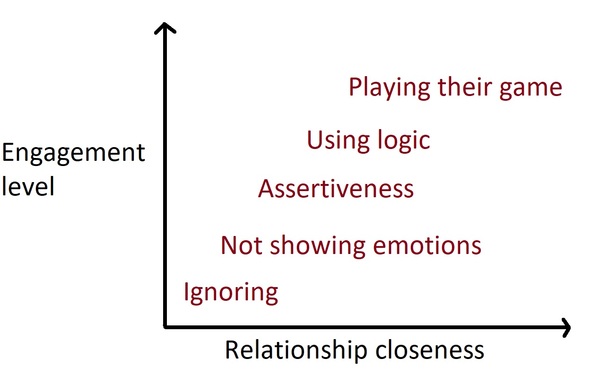To manipulate someone means to make them do something that’s not in their best interests. Manipulations always incur some cost on the manipulated and a benefit to the manipulator.
Manipulation is different from influence. You can influence someone to do something that is in their best interests. For instance, a marketing campaign that influences you to buy a product that improves your life isn’t manipulation because improving your life is in your best interests.

On the other hand, a marketing campaign that influences you to buy something that does you no good is definitely manipulation. The marketer wins, and you lose. Manipulation is always win-lose.
Detecting manipulation
Often, people don’t realize they’re being manipulated until it’s too late. So, the best thing you can do to avoid getting manipulated is to detect manipulation in its early stages.
Signs you’re being manipulated include:
- You feel emotionally drained after your interactions with a manipulator
- You feel powerless and helpless
- You feel guilty, disrespected, and devalued
- You feel pressured to act in a certain way
- You feel frustrated and confused
You may have noticed that all the above signs start with “You feel…”. This is because manipulation usually happens on an emotional level. Emotional manipulation is powerful and can easily be detected at the level of emotions.
You have to notice the shifts in your emotional energy to tell whether or not you’re being manipulated.
Never assume manipulation based on a one-off event. If they’re a manipulator, chances are they’ll try to manipulate you repeatedly. Look for patterns.
Once you see the patterns, try to figure out what the manipulator is trying to gain by manipulating you.
Now that you have a behavioral pattern and a motive, you can beat the manipulator at their own game.
How to manipulate a manipulator
Here are some universal tactics that can counter almost all forms of manipulation:
1. Ignoring the manipulator
As soon as you realize you’re being manipulated, opt out of their game. Stop giving any more energy to the manipulator. A manipulator needs engagement from you to manipulate you.
When you’re disengaged, none of their tactics is going to work. Be like a wall when interacting with them. Everything they say and do bounces right off of you.
Delaying reacting and give yourself time to respond appropriately or not at all.
2. Not showing emotions
If you’re at a point where you can no longer opt out of their game, a manipulator has likely gotten hold of your emotions. They’ve had you emotionally involved.
This usually happens when people who are close to us manipulate us. It’s easy to ignore strangers, but ignoring friends and family members is hard and can have consequences.
Once you’re under your manipulator’s emotional grip, you can’t help getting affected emotionally by the things they say and do.
No matter how you feel inside, avoid expressing it on the outside. This can be hard to do, especially for people who tend to be expressive and honest. But you need to do it if you want to disempower your manipulator.
When a manipulator sees they can press your emotional buttons, they’ll control you like a puppet. When they see they don’t emotionally affect you, they’ll conclude you’re hard to manipulate.
3. Assertiveness
Using assertiveness to counter manipulation can be risky because assertiveness involves a good level of engagement. If you’re assertive with your manipulator, you’ll likely sink deeper into their trap and get involved in a conflict.
Although your goal should be to minimize engagement with the manipulator as much as possible, sometimes confrontation and conflict are necessary.
If ignoring and being emotionally unexpressive doesn’t work, you’re forced to be assertive or even aggressive.
When someone manipulates you, they get the upper hand on you. They gain power over you. You can disempower them using assertiveness or aggression.
Examples of assertive communication would be:
“I know you’re trying to manipulate me.”
“I won’t tolerate that behavior from you.”
Aggressiveness involves some devaluing of the manipulator to re-balance power:
“You should be ashamed of your behavior.”
“I expected that shitty behavior from you.”
4. Using logic
Since most manipulation tactics are emotional, you can always use logic to counter them.
Note that it requires a greater level of engagement from you. So you should reserve this method only for people who are the closest to you.

A manipulator will often use some biased emotional reasoning to manipulate you. For example, they might say something like:
“You always do this to me.” (Making you feel guilty)
“You’re a failure.” (Devaluing you)
You can challenge the first statement by saying something like:
“Always? Are you sure? Let’s think of examples where I did the opposite.”
And the second statement by:
“Awesome! I make one mistake, and I’m a failure. What about all the times when I didn’t screw up?”
As you can see, you’re defending yourself here. It’s okay to defend yourself in close relationships when a lot is at stake.
Note that using logic only works on logical people. If your manipulator is anything but logical, it’s best to stick to previous methods.
5. Playing their game
You know their behavioral patterns. You know their motives. Great!
You have everything you need to give them the ultimate blow.
You first let them think they’re getting away with their manipulation by doing precisely what they expect you to do.
You back out just before they get that big win in the end. You don’t do what they expected you to do. Or you do the exact opposite. Doing so will throw them deep into the depths of confusion and frustration.
They’ll have invested a lot of time and energy into manipulating you and not have anything to show for it.
They’ll be sure not to mess with you again.
